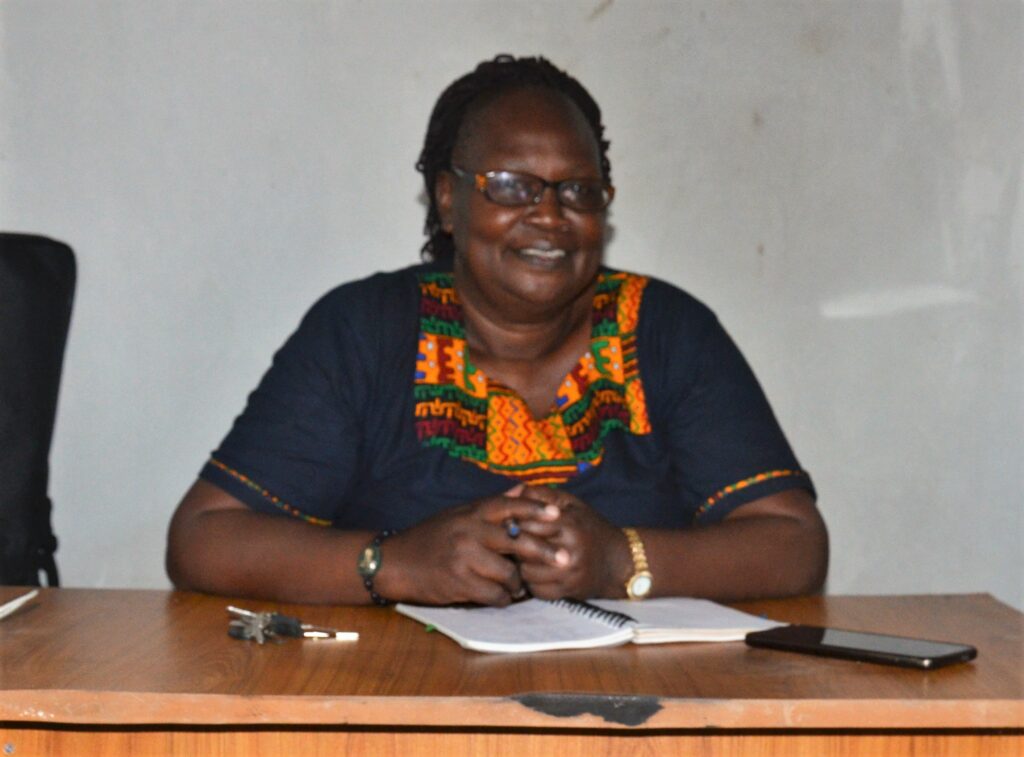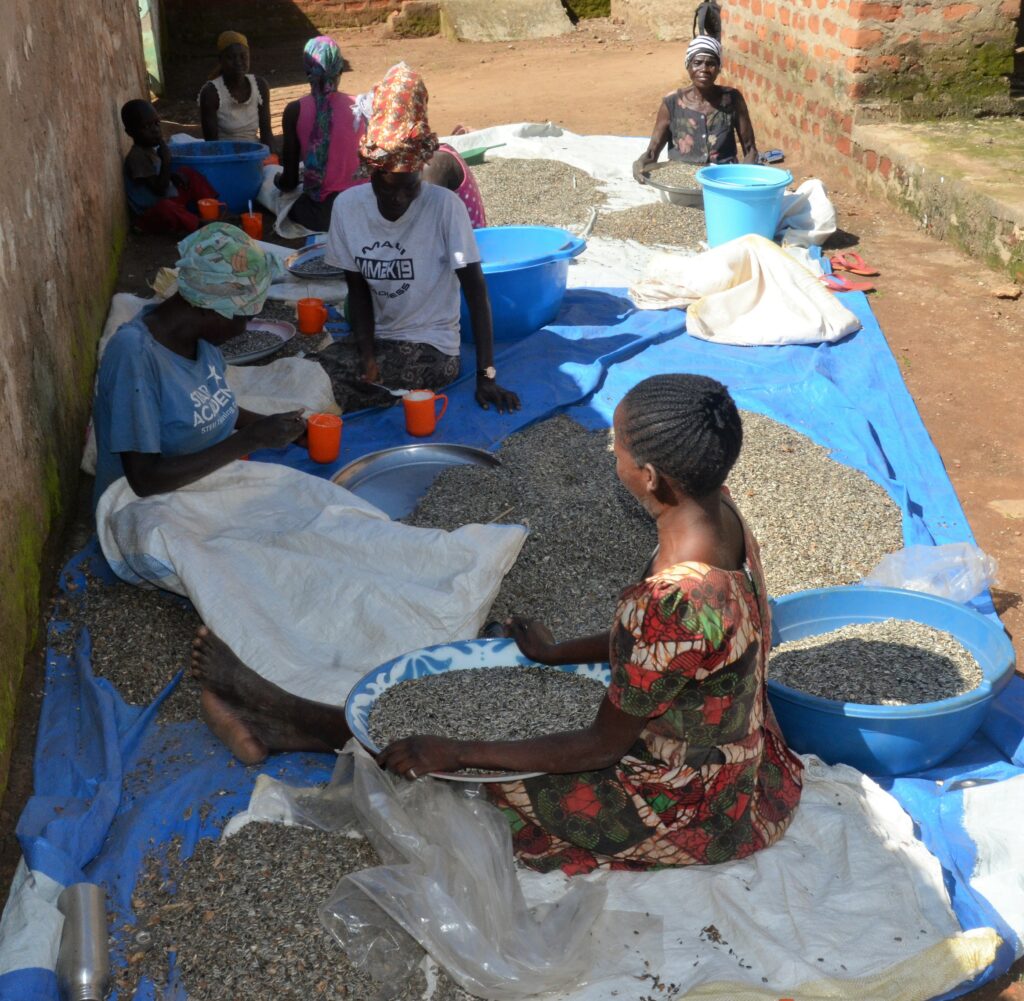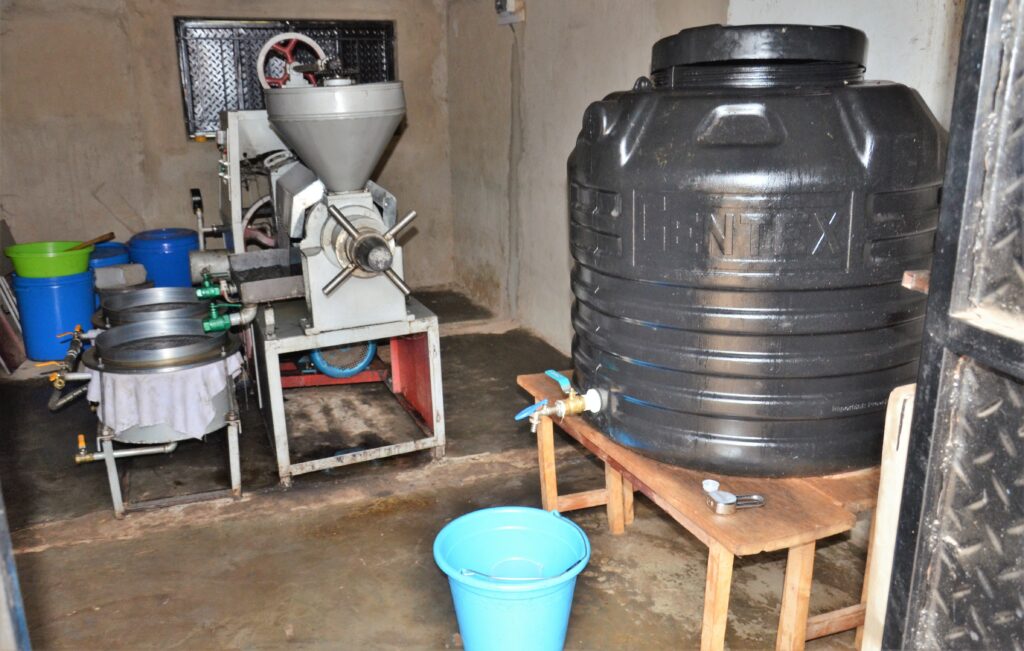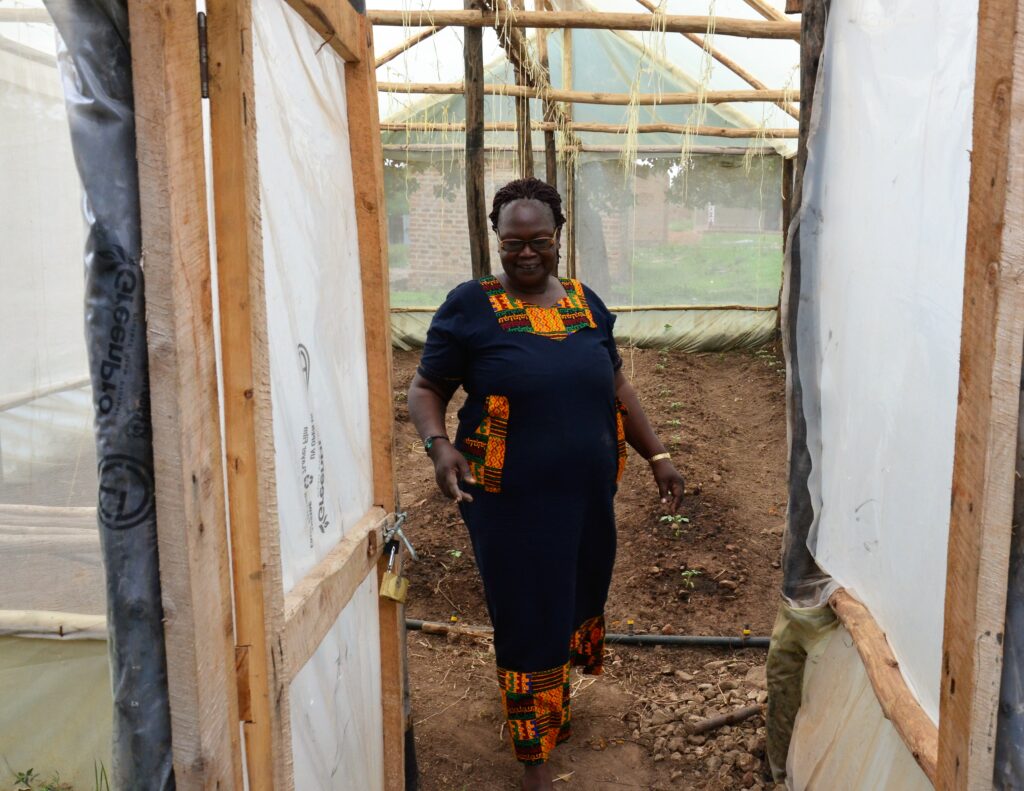By Robert Adiga
It is not about the size of the land that matters in achieving success in farming, but the idea and actualising it.
This is what has changed the life of Caroline Lilly Ocanda, a 56-year-old resident of Origama cell, Oluko ward, Ayivu Division in Arua City who practises urban farming on one-and-a-half acres of land.
Ocanda’s farm is named New Beginning Investment Limited, where she grows various crops, keeps livestock but also processes cosmetics and soap from shea butter as well as cooking oil from sunflower.

Motivation
Ocanda, a professionally trained social worker says she had the passion for agriculture from her childhood since that was the family’s livelihood.
“My late father and mother used to take us to a forest to cultivate and get food and that was where I drew my passion for agriculture. From an early age, I learnt that agriculture was paying our family,” Ocanda revealed.
Till now, Ocanda is a trained social worker who is still actively involved in dealing in issues with the community such as training women on Gender Based violence, moving to schools to sensitize learners on the topics related to strikes but works more now as a consultant training farmers on best farming practices.
Fish Farming
In 2020, as the COVID-19 pandemic struck, Ocanda desired to diversify her sources of income. She opted for fish farming which she started with 1,000 fish fingerlings stocks which she bought at 2,000 each.
“I realized the valley dam which my mother dug near the home was being under-utilised and I took the initiative to start fish farming. I had acquired knowledge from colleagues especially those who were into commercial fish farming in Arua City and other parts of the region including late Charles Yangu from Koboko,” said Ocanda
She set up two more ponds and stocked one with 1,000 tilapia, which have since multiplied to over 4,000. She adds that she is planning to introduce catfish in the second fish pond after harvesting the current stock which will be done in the coming months.
Horticulture
As Ocanda looked at the size of the land the family had vis-a-vie the demands in the family and her desire for farming, she opted to start a horticulture farm in 2021 growing varieties of vegetables for both the family consumption and income generation.
She just started with less than sh200, 000 in the first year for both clearing and purchasing the seeds.
“The land was so neglected that people were just using it as a walkway because it was not yielding. Anything you put on it would die. But land is just like human beings you need love and feed it,” she says.
She started feeding the land with manure and droppings from animals for more than six months she then used it for planting the vegetables.
“People started coming to me and find out what I did to the land that it became productive but I just fed it with manure, that is how I am able to earn a lot from it,” revealed Ochanda
The vegetables Ocanda grows include tomatoes, cabbages, onions, spinach, sukuma wiki, strawberry and dodo, among others all in about one quarter of land about 25x10m

Greenhouse establishment
When she thought of ensuring long term growth of the green vegetables, again in 2021, Ocanda says, she chose to establish a green house near the land for horticulture which is helping her to extend horticulture production and currently the green house is full of the tomatoes.
According to her she used slightly over sh5m to set us her greenhouse and she keeps on improving it every year.
Dairy Farming
For diversification, early this year, she acquired three heifers that have been artificially inseminated and she is hopeful that by August or September, she will start to generate enough milk and earn an income from it.
“Dairy business is a lucrative one when you produce a lot of milk and it is an income generating activity and I am taking good care of the animals. The cows are fed on both dry and fresh grasses.”
Ocanda goes to value addition
In the past five years, through her company called New Beginning Investment Limited, Ochanda in 2021, acquired a cold pressing machine which she uses to process oil from sunflower and shea butter.
“Initially I got it for processing shea butter, but realised this could only be harvested once a year, so I realized I was underutilizing it yet farmers were growing sunflower,” he says. The machine is multipurpose, it can press shea butter, sunflower and soya beans, among others. She chose to process sunflower. She buys sunflower from the farmers in the community. To get constant supply, she has started distributing sunflower seeds to the farmers, which she in turn buys when it matures.
Ocanda says, currently she can process up to five tonnes of sunflower in a month into oil. Her vision is to increase production of sunflower in the region to raise the production of the high-quality sunflower oil.
She also manufactures cosmetics that include jelly and cream, as well as shea butter in her factory.
Labour force
Through her various enterprises, she has employed a total of 14 permanent workers and 20 casual ones who are brought on board whenever there is a need.
“Those who I pay on a monthly basis earn an average of sh150, 000 with those in processing work earn more than the rest, while women and youths who are hired on daily basis based on availability of work are paid as agreed.” Ocanda said.
She says, her workers are reliable and she does that by motivating them with both cash and in kind aside of their monthly income.
Use of locally available technology
Ocanda who is thriving through use of locally available solutions says, she has opted to use compost manure as opposed to artificial fertilisers.
“From the cows, I get dung that I use in the field and droppings from the goats are used in the fish pond and the grasses a cut after the animals have eaten I also use to create manure for the garden,” said Ocanda

Record Keeping
Ocanda says, as an entrepreneur, record keeping is a very important aspect to her in all her enterprises, and it is what has helped her track the success of her farming practices.
“I practice what I am teaching people, because I have been emphasizing record keeping during the trainings I conduct for the entrepreneurs and all my record books are up to date,” she says.
She does income and expenditure analysis at the end of the day and this helps her know whether there is a profit or not.
COVID-19 pandemic.
Ocanda stated that COVID-19 hit her the hardest way, a reason she opted for so many other enterprises aside of the social work career since movement became a challenge which also affected her income.
“I was idle at home and this made me to think about so many things to do for the survival and that is when I came up with the different farming plans”, Said Ocanda.
She added that, though she had the farming business in plan, her busy schedules made her not to take decisions to start not until the OVID-19 period when she engaged fully into farming business.
She said the small money she saved was what she used to start the different enterprises during the COVID since her land was just near the homestead.
“This was when I realized the importance of saving and also having an alternative source of income’, Ocanda added.
Earnings, expenditure
Without disclosing the exact figures for the profits accrued from the various enterprises, Ocanda acknowledged that the farming business is sustaining her family and ploughing back the rest into the enterprises. She has used some of the profit to acquire machinery to run the businesses,” Ocanda revealed.
“The income I earn is enough, although I’m working out ways of making the enterprises more profitable,” she says.
Family involvement
Her family members both her children as well as her nieces and nephews, Ocanda says, are fully involved in the different enterprises particularly fish farming, green house, horticulture and dairy farming.
“When I registered my company, I made my children the directors in the company. They know everything taking place in the company so I am not worried,” she says.
She is sure that when she is not around, the company will not collapse. “I am sure they will sustain it because they are well acquainted with the enterprises on the farm,” she says.
Ocanda says, she assigns different tasks to the family members based on their competence and capabilities and as a result majority of them are well versed with the different enterprises.
Investing in knowledge.
Apart from Ocanda training her children and relatives to understand the enterprises, she has also ensured some of them study courses related to agriculture, for example, horticulture and aqua culture among others.
“Sometime back I got involved in a project of training in agriculture in greater Arua and I took 200 youths to be trained in Najera Kampala for about one week, including some of my workers. I also sponsored six youths in relevant training in agriculture and they are the ones helping on the farm, while others have opened their own farms and are now earning a lot of money through the knowledge, they have acquired through me,” she explained.

Community impact
Ocanda says, through her interventions, youth have been able to learn a lot in areas of looking after animals, poultry and marketing horticulture, among others including pressing the oil.
“They keep on sending me messages on how they are doing after they were trained from Najera Kampala and the 200 youths have been training the farmers in their different parishes. I built big networks with different stakeholders and youths who are doing tremendous jobs in the community and opened big businesses to employ people. I am happy that I have been able to change the lives of the youths in our community,” she says.
Through the value addition, she adds, many of her neighbours, especially women have been earning a living by cleaning the sunflower and other casual work including in her horticulture farm as a result of casual works.
Ocanda says the number of people engaged in horticulture has increased in her community since she has taught them how to make the unproductive land usable for production of green vegetables using local manure.
Marketing
Ocanda does not have to hustle to look for the market for her produce and products as whatever she produces have ready markets and are being bought from her home without incurring transportation costs.
“When I process oil, I get very many orders and even when I am harvesting fish, they are not always enough, including the green vegetables that the women vendors always scramble for.
Achievements
Ocanda says, despite not engaging in farming for very many years, she has been able to register a number of achievements through her farming practices.
Her greatest achievement, she says, is paying school fees for her children in higher institutions of learning.
From the one enterprise she started with, fish farming, she now has several that include horticulture and value addition. Using the proceeds she has been able to construct a decent house for her and the family.
“I am also trying to add another fishpond and expand the horticulture farm apart from the heifers I have acquired and all these have been made possible due to the diversification I do in the farm,” she says.
Challenges
Her major challenge, Ocanda says, is getting the workers who are reliable and those who are well-trained end up leaving the farm to set up their own enterprises.
She also noticed the changes in weather as another challenge, especially in horticulture farming where sometimes rains are not consistent.
Ocanda also expressed the challenge of lacking a regular constant source of water to be used in her farm.
Physical and bio security
Ocanda says, as a way of protecting her different enterprises, she chooses to fence off all his different businesses like the fish ponds, horticulture field, green house among other all locked with gates.
She also employs a private security guard to take care of the value addition premises.
Plans
Ocanda said: “My major plan for the future is to see how I can impact on the youths to venture into farming because I have seen many of them wasting their energy in doing unproductive things so I want to have this place as a training centre for the youths.”
There is also another plan of acquiring bigger land to practice farming on a bigger scale as well as to improve her sunflower production factory that can supply the whole country.
Farming tips
Love what you do.
Be consistent in whatever you do.
Be focused and achieve your targets in whatever you endeavor in.
What others say
Vivian Edezuyo, 23, resident of Ariwara cell, worker
My work is to sort the sunflower seeds. The kind of training and guidance she gives us is quite encouraging and I am also planning to start planting sunflower so that I can sell for her, I also want to be so close to her such that I can learn my own skills which I can practice also at my home.
Shamira Draru, 20, a single mother, worker
I have worked here for years in the different enterprises. Ocanda guides me in whatever I am doing. In the evenings, I try to practice what I learn from her farm at home. I have started getting my own money from what I plant.
Gerald Apangu, a community member
She enabled me get training in various skills that I have used to earn an income. Ocanda is a real mentor who wished well for everyone and willing to transform the lives of others unconditionally and I am sure through his farm many people especially the youth will come out of poverty since she is passionate about the welfare of the youths in the entire Westnile region.





